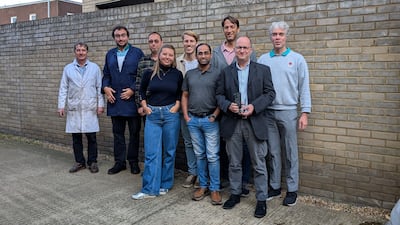Air conditioners are set to become ever more common in the coming decades, with the International Energy Agency forecasting that demand will triple by the middle of this century. Global warming is one reason for this, but more important is growth in incomes in countries such as India.
Despite air conditioners becoming more efficient, the IEA has forecast a 45 per cent increase in energy demand for cooling by 2050, compared with 2016 levels, potentially jeopardising efforts to combat climate change.
"If we’re not able to ensure that the growth in cooling, which is needed from a social needs perspective, is done in an energy efficient way, all net-zero targets are eradicated," said Florian Schabus, chief commercial officer of Barocal, a start-up energy company in the UK.
What is the new technology?
Barocal has attracted about $2 million in funding, 25 per cent of it from Breakthrough Energy, which was founded by Bill Gates, to advance its technology based on the use of solid materials – instead of refrigerant gases – for cooling and heating. The start-up's barocaloric materials become hotter when pressure increases and cooler when pressure decreases, echoing the behaviour of refrigerant gases, except that the solids are said to be more efficient.
"This is really the very first fundamentally new technology the industry has seen in 100 years – vapour compression has been working the same way for 100 years," Mr Schabus added. "Obviously they have improved the systems a lot over time and they’re more efficient, but this can be similar to how batteries are impacting the automotive industry.

"We can show that our systems actually can deliver two to three times higher energy efficiency than a normal cooling system, which we believe is really a fundamental step change for how we’re going to heat and cool our economy."
The start-up says its technology gives a strong climate benefit because refrigerant gases, which leak from systems, can contribute to increasing global temperatures, with some thousands of times more potent as greenhouse gases than carbon dioxide. Energy use for air conditioning accounts for about 7 per cent of global electricity consumption, which translates to about 2.7 per cent of global carbon emissions, OurWorldinData shows. Refrigerant gases add another 0.5 per cent to air conditioning’s contribution to climate change.
Heating also consumes large amounts of energy, accounting for about 80 per cent of home energy demand in Europe and 60 per cent in the US, the World Economic Forum said. OurWorldinData states that heating generates four times the carbon emissions of air conditioning, although this figure covers the heating of water, as well as spaces.
Dr Steve Griffiths, vice chancellor for research at the American University of Sharjah, said it was "extremely important" to limit electricity consumption from cooling, while also dealing with the fluorinated gases. "Everyone has written [that] they’re so worried about electricity consumption from data centres. The reality is that consumption from data centres by the end of this decade is going to be maybe half of the electricity demand that’s going to ramp up for air conditioning," he said.
"We’ve done a lot of studies in India, in South-East Asia – these places that are very hot are going to have more demand for air conditioning and those air conditioners are going to have to be climate friendly in some way, so having new technologies for cooling is one of the most important topics."
A changing industry
Barocal was founded by Xavier Moya, professor of materials physics at the University of Cambridge, where much of the research work to identify and develop the materials was carried out. Mr Schabus said the solids – types of plastic crystal – are non-toxic, non-flammable and easily recyclable, and are easily available through existing supply chains. Applying pressure to them stops a rotation within their molecular structure, releasing heat, while a reduction in pressure has the opposite effect.
It is thought the materials could be used for refrigeration, or for cooling or heating buildings. Mr Schabus said there was no degradation in how they operated, even over decades. While Barocal says its technology offers a step-change in efficiency, reductions in energy consumption are in evident in air conditioners that use gases, said Taqeef, an air conditioning company in the UAE.
Srinivasan Rangan, the company's senior director for engineering, said the heating, ventilation and air-conditioning (HVAC) industry had "undergone a remarkable transformation in recent years, with energy efficiency at the forefront of innovation".
"Our current systems demonstrate 35 to 40 per cent greater efficiency coming from multiple technological advances, such as variable refrigerant flow systems that offer precise temperature control while minimising energy use," he said. "We're also seeing excellent results from integrating smart building management systems that use artificial intelligence to optimise HVAC operations based on real-time conditions."
He said Taqeef was also transitioning to more environmentally friendly gases such as R32, commonly described as a low global warming potential refrigerant. "Looking ahead, we're excited about the industry's trajectory towards even greater efficiency," Mr Rangan added. "The Global Cooling Pledge's target of 68 per cent reduction in cooling-related emissions by 2050 is ambitious but achievable through continued innovation."
Where will this technology be launched?
While the air conditioning industry as a whole is moving towards greater efficiency, partly offsetting the greater uptake in devices, Mr Schabus said Barocal was reporting "very strong interest" in its technology.
The company, which has fewer than a dozen staff, has been through three generations of prototypes of its devices, the latest of which has a power of about one kilowatt, which is about the same as a large fridge or a small air conditioner. Initial commercial use could be in large office buildings or chilled beverage cabinets, because with such commercial applications there is less sensitivity to the fact purchase prices are likely to be higher, at least for now.
Mr Schabus said a pilot project to demonstrate the performance of the system to large manufacturers is set to begin next year. "Before they commit to engage with us and produce these systems on a larger scale, they want to see that the performance that we see in the lab can be replicated in real life," he said.
Commercial availability, probably through a multinational partner that will manufacture devices using Barocal’s technology, could happen within a few years. "We don’t want to end up in a situation where we’re being compromised on our IP [intellectual property] or swallowed by a large partner. That’s the challenge at our end," he said. "We have to ensure that our technology is not ending up in some drawer of some big corporate because the strategy changes, which means that we have to develop it as much as possible ourselves and work with them wherever needed."


